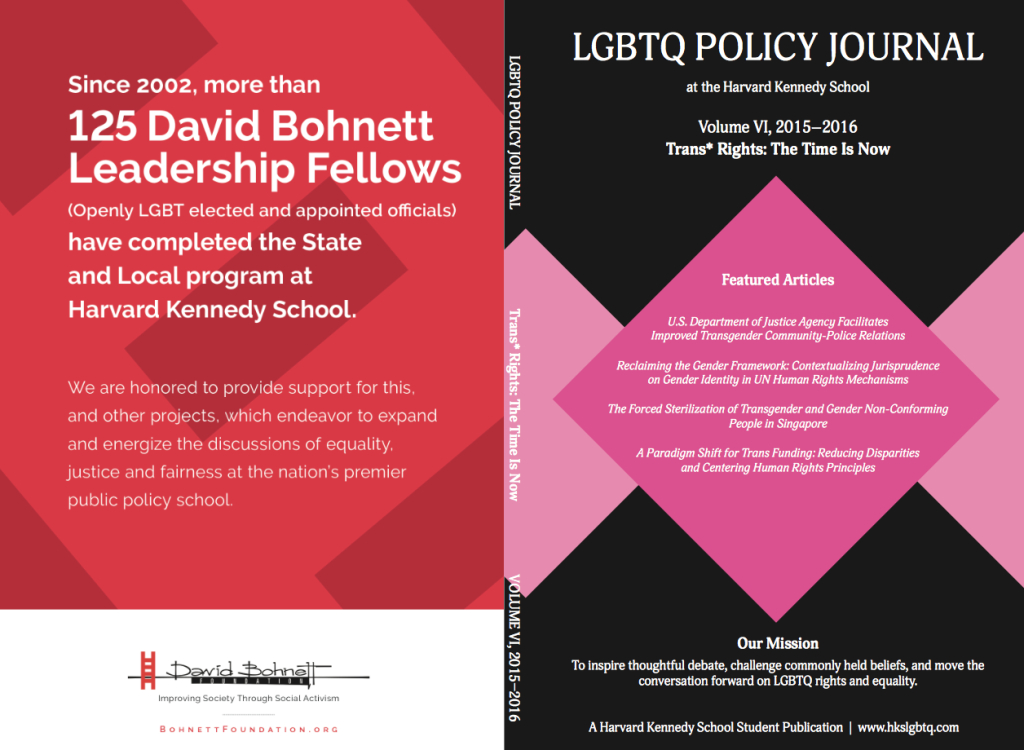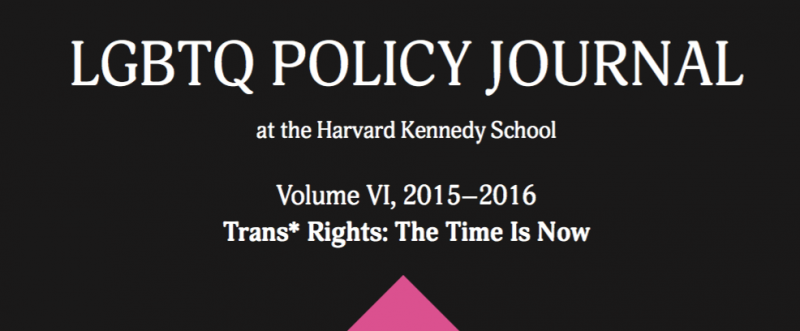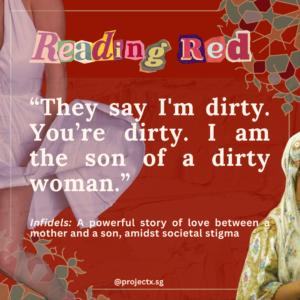At the turn of the year, Project X was contacted by the Harvard Kennedy School to contribute an article for the prestigious institution’s journal. While daunting, we sought to shed light on a particularly distressing issue which was scarcely ever discussed – forced sterilisation (programs or government policies which attempt to force people to undergo surgical or other sterilisation).
The journal also includes articles from a myriad of other individuals, exploring the issues facing LGBTQ persons from Honduras to the United States.
Download the journal here.

SUMMARY: The Forced Sterilisation of Transgender and Gender Non-Conforming People in Singapore.
“Though the movement is sometimes referred to colloquially as LGBT, I excluded transsexual and transgender individuals from my study. They deal with different laws and issues in Singapore, and gay activists also do not address their concerns or do so more as an afterthought.” —Lynette Chua
“Every person’s self-defined sexual orientation and gender identity is integral to their personality, and is one of the most basic aspects of self-determination, dignity, and freedom. No one should be forced to undergo medical procedures, including sex reassignment surgery, sterilisation, or hormonal therapy, as a requirement for legal recognition of their gender identity. No status, such as marriage or parenthood, may be invoked as such to prevent the legal recognition of a person’s gender identity.” —Yogyakarta Principles
“Because as a person of south-east Asian heritage, I want to honour the third gender status that is culturally normative to our societies and cultures before British colonialism. For example, the Bugis people had a five gender system.”
—Thirty-year-old non-binary genderqueer survey respondent
On 30 July 1971, Professor S.S. Ratnam, Associate Professor Khew Khoon Shin, and R. Sundarason conducted the first male-to-female sex reassignment surgery (SRS) in Singapore.2 A total of 413 sex reassignment surgeries were conducted in Singapore from 1971 to 1990, and because of this, Singapore was known internationally for being one of the leading countries for such operations.
In 1973, Singapore allowed post-operative transgender people to change the sex marker on their National Registration Identity Card (NRIC), a card that is used in many day-to-day activities including going to the bank and signing up for the gym. This policy change was considered a progressive move, especially considering this was not possible in any other country in the south-east Asian region.
In 1991, a landmark court case, Lim Ying v. Hiok Kian Ming Eric, gave the transgender and gender non-conforming communities a reality check as Hiok’s marriage was nullified due to his identity as a transgender man. Even though he had undergone the required surgeries and had changed the sex marker on his NRIC, his birth certificate still stated he was female. Birth certificates cannot be changed, and as such the judge ruled that “the personal
54 LGBTQ POLICY JOURNAL
particulars on a person’s identity card when it was considered alone were not conclusive evidence of the sex of that person for the purposes of marriage.” However, despite this setback, in 1996, the Women’s Charter was amended to recognise the (heterosexual) marriage rights of a post-operative transgender person. The Women’s Charter is a legislative act that was passed in 1961 and was meant to govern matters relating to marriage, divorce, sex work, sex trafficking, and the rights of the child. The relevant section of the statute reads (emphasis added):
Some respondents to our interviews, who have undergone sex reassignment surgery (SRS), indicated that they are satisfied with this law, as it allows them to be who they are, thus resolving their gender identity dysphoria. Furthermore, this seems to be a rather progressive piece of legislation, especially when compared to neighbouring country Malaysia, where after a high-profile four-year legal battle that ended in 2014, cross-dressing is still considered illegal.
However, many transgender and gender non-conforming people cannot afford or choose not to undergo SRS for a variety of reasons that will be explored in this paper. As their gender identity and expression do not match their legal documents, this poses many problems including homelessness, unemployment, discrimination, and violence. Sex work also remains a reality for many trans women, and while it is somewhat tolerated in Singapore, prejudice and violence persists in the industry.
As such, this paper seeks to examine the impact of the current gender recognition laws on the lives of transgender and gender non-conforming people in Singapore. In particular, we aim to better understand the impact of being able to change one’s sex marker on their NRIC only on the condition of SRS and the inability to change one’s birth certificate. We do this firstly by presenting findings from our survey that illustrate the diversity of the trans and gender non-conforming communities in Singapore, as well as their opinions on the current gender recognition laws. We then move on to analysing the barriers to SRS for people who want to undergo the procedure, and the difficulties that people who do not wish to undergo SRS face. We conclude by presenting our thoughts for a more inclusive future.






